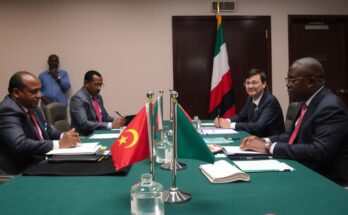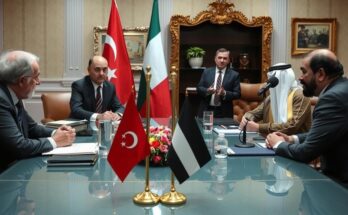Saudi Arabia has abandoned its pursuit of an expansive defense treaty with the United States linked to normalization with Israel, shifting to seek a more modest agreement instead. Crown Prince Mohammed bin Salman firmly maintains that any normalization hinges on Israel’s commitment to establishing a Palestinian state, aligning with the 2002 Arab Peace Initiative. This change is influenced by the complexities of Israeli internal politics and the broader geopolitical context of West Asia as expressed by U.S. President Joe Biden.
Saudi Arabia has shifted its strategy regarding a defense treaty with the United States in light of the stalled efforts to normalize relations with Israel. According to reports from Reuters citing various officials, the kingdom is no longer pursuing an ambitious defense agreement as part of a broader deal but is instead aiming for a more modest pact with the U.S. Saudi Crown Prince Mohammed bin Salman has made it clear that any normalization with Israel is contingent upon Israel’s commitment to the creation of an independent Palestinian state, as proposed in the 2002 Arab Peace Initiative.
Israeli Prime Minister Benjamin Netanyahu remains enthusiastic about the prospect of normalizing relations with Saudi Arabia, viewing it as a significant step toward greater Arab acceptance. However, internal political dynamics make it challenging for Netanyahu to advance a two-state solution without jeopardizing his governing coalition. As a consequence of the contrasting positions held by Saudi Arabia and Israel, both Riyadh and Washington are exploring the possibility of finalizing a modest defense agreement before President Joe Biden’s term concludes in January.
Initially, Saudi Arabia sought a comprehensive defense pact with the U.S. that included enhanced military support and a nuclear program in exchange for normalization with Israel. Nevertheless, due to Tel Aviv’s refusal to advance discussions regarding Palestinian statehood, Saudi Arabia has toned down its expectations and is now advocating for a more straightforward defense arrangement. This shift follows a fragile ceasefire between Hezbollah and Israel that commenced recently.
The context of this situation is rooted in the ongoing conflict surrounding Palestinian statehood and Israel’s relationships with its Arab neighbors. The 2002 Arab Peace Initiative proposed normalization with Israel contingent on progress toward a viable Palestinian state. Saudi Arabia, as a regional leader, has played a pivotal role in these discussions, seeking to balance its aspirations for modernization and international relations with its long-standing support for Palestinian statehood. The dynamics between the U.S., Saudi Arabia, and Israel are influenced heavily by these geopolitical factors, particularly in light of recent escalations in violence and the broader vision for stability in West Asia promoted by the U.S. administration.
In summation, Saudi Arabia’s reconsideration of its defense pact with the U.S. reflects the complexities surrounding normalization with Israel amidst the Palestinian statehood stalemate. Crown Prince Mohammed bin Salman’s insistence on Palestinian rights as a prerequisite for normalization exacerbates the already fraught Israeli political landscape. As efforts continue to negotiate a more achievable defense accord, the region remains at a critical juncture, influenced by both historical commitments and the evolving political climate.
Original Source: thecradle.co




